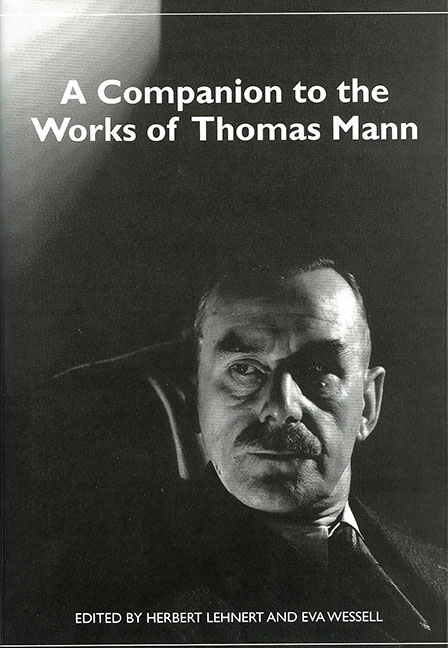Book contents
- Frontmatter
- Contents
- Foreword
- Thomas Mann's Works
- List of Abbreviations
- Introduction
- Thomas Mann's Beginnings and Buddenbrooks
- Art and Society in Thomas Mann's Early Novellas
- Love in Society: Thomas Mann's Early Stories
- “Death in Venice”
- “Mein ‘Friedrich’ — das ist was Anderes”: Thomas Mann's Unwritten Novel about Frederick the Great, King of Prussia
- Magic and Reflections: Thomas Mann's The Magic Mountain and His War Essays
- Thomas Mann's “Autobiographical” Stories
- Joseph and His Brothers
- Lotte in Weimar
- Thomas Mann's Late Politics
- “German” Music and German Catastrophe: A Re-Reading of Doktor Faustus
- The Gaze of Love, Longing, and Desire in Thomas Mann's “The Transposed Heads” and “The Black Swan”
- Felix Krull
- Female Identities and Autobiographical Impulses in Thomas Mann's Work
- Betrayed or Not Betrayed: A Testament?
- Thomas Mann's Comedies
- Notes on the Contributors
- Select Bibliography
- Index
Thomas Mann's Beginnings and Buddenbrooks
Published online by Cambridge University Press: 28 April 2017
- Frontmatter
- Contents
- Foreword
- Thomas Mann's Works
- List of Abbreviations
- Introduction
- Thomas Mann's Beginnings and Buddenbrooks
- Art and Society in Thomas Mann's Early Novellas
- Love in Society: Thomas Mann's Early Stories
- “Death in Venice”
- “Mein ‘Friedrich’ — das ist was Anderes”: Thomas Mann's Unwritten Novel about Frederick the Great, King of Prussia
- Magic and Reflections: Thomas Mann's The Magic Mountain and His War Essays
- Thomas Mann's “Autobiographical” Stories
- Joseph and His Brothers
- Lotte in Weimar
- Thomas Mann's Late Politics
- “German” Music and German Catastrophe: A Re-Reading of Doktor Faustus
- The Gaze of Love, Longing, and Desire in Thomas Mann's “The Transposed Heads” and “The Black Swan”
- Felix Krull
- Female Identities and Autobiographical Impulses in Thomas Mann's Work
- Betrayed or Not Betrayed: A Testament?
- Thomas Mann's Comedies
- Notes on the Contributors
- Select Bibliography
- Index
Summary
To understand the anarchic undercurrent in the writings of the young Thomas Mann, let us consider two differing testaments by his father. In an 1879 will, the wholesale merchant Thomas Johann Heinrich Mann, senator of the Free Hanseatic City of Lübeck, made his wife and children his heirs. His principle property was the firm “Johann Siegmund Mann,” which he wished to have continued. One of his children was to join the firm upon reaching maturity; he certainly had his sons Heinrich and Thomas in mind. Twelve years later, in 1891, ill with bladder cancer and facing an operation, he decided otherwise: he ordered his business to be liquidated. He appointed guardians to invest the result of the sale, to administer the fortune and regularly pay the interest out to his widow, who was to pass a share on to each of their five children. The senator determined the dowries of his daughters and designated a certain sum for the “establishment” of his sons. He charged the guardians to promote a practical (his emphasis) education of his sons in order to keep them from the bohemian lifestyle that tempted his older son Heinrich. Specifically, the guardians were to oppose Heinrich's “so called literary activity,” which, the senator felt, did not meet the prerequisites for a professional writer, as he understood them: “sufficient studies and knowledge.” In addenda to his will, the senator reproached Heinrich for perceived indolence and recklessness against others (meaning himself). Thomas, his second son, fared a little better. He, the father mused, could be influenced by quiet reasoning and would find his way to a practical occupation. But he did not entrust Thomas with the family firm either. The guardians, solid Lübeck burghers, never considered a writer's career “establishment” in the sense of the senator's will, thus never paid their legacies to either Heinrich or Thomas, but kept the control of the senator's fortune until it dissipated in the German inflation of 1923. The modest monthly interest the brothers did receive allowed them to subsist and write until they had earned sufficient income from their publications.
Their father had directed his rage against the life goals of both brothers in his testament. But they respected his superior intelligence, and did not hate, but instead even continued to hold him in admiration.
- Type
- Chapter
- Information
- A Companion to the Works of Thomas Mann , pp. 29 - 52Publisher: Boydell & BrewerPrint publication year: 2004

